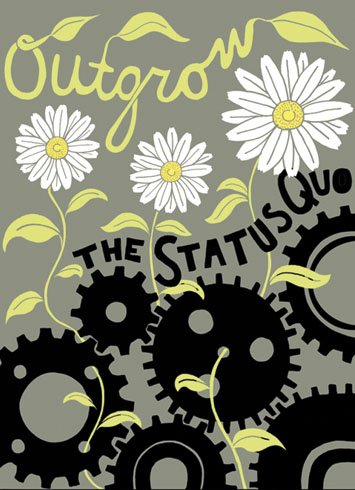We Called It Occupy
by Kim Tran
Every day,
I walk
by the same set
of steps.
In the daytime
the sun shines brightly
on young students gathering
on its low gray platforms
laughing,
flirting,
eating sandwiches.
Occasionally
they smile,
at me
or each other.
I watch as they come and go,
as they ascend and descend
the molded concrete
on which hundreds like them sat
on a cold clear evening
in November.
I remember a moment.
When the same steps
shone
not with sunlight,
but effervescent faces.
Eager,
unyielding
they opened their hearts
to poetry,
youth,
and calls to action.
I remember a moment.
When the structures
of oppression
met
tents of resistance
and hollow poles
and thin fabric
became monumental.
I remember an all-too-brief moment.
When so-called revolutionaries
left their armchairs
and
bankers ceased counting money.
When protesters
danced
politics
in the streets.
I remember.
When we put our bodies on the gears
and listened
as the ground
beat
with the marching footsteps
of
possibility.
I remember,
I remember a moment.
When we refused to compromise.
When we decided not to change the rules,
but the game.
When we made heads spin.
When love became power.
Yes, there was a moment.
We called it occupy.
Owning the Earth
by Joan Clair
No one may live for free.
The earth is bought and sold.
To not own is indecency.
To not own is a felony.
One must pay for a pilgrimage
to be on sacred ground
and hope that when one gets there
It is still around.
In a world full of belongings
there is no place to belong.
The machinery moves in,
and forests are cleared to the ground.
The machinery moves in,
and the homeless are cleared
from where they’re found.
In a rainforest a lone orangutan
flees its toppled tree.
What is done to that orangutan
Is done to all of us, to me.
On an earth that’s bought and sold,
no one may live for free.
Care
by Joan Clair
It’s hard to find any place in the world that wants you.
Maybe that’s why when I see
People pushing shopping carts on the street,
Injured birds, and children crying
to miles of indifference,
I care.

Room for Beauty
by Joan Clair
In Berkeley’s downtown business district
early in the morning, too early for enmity,
there’s a man asleep in a sleeping bag
on a bench on the sidewalk near the street.
All his belongings are orderly,
placed neatly near his sleeping body,
but what takes my breath away
is the beauty of the paintings surrounding him
as if he placed them there
so that his last glimpses before sleep
would be beautiful and good.
And suddenly I’m seeing a soul asleep in his room —
a sanctuary which celebrates beauty,
illuminated by more than a street light.
And I know there are millions
in so-called real homes
who have never done what he has.
A Man and a Scone
by Joan Clair
A man wearing lifeless clothes
sits in dark shadows against a wall.
He chews on a desolate-looking scone
without the relish of a dog for a bone,
and asks for nothing, nothing at all.
These shadows surprise on a bright, sunny day
with brightly lit people going their way.
Who expects to see shadows of humans on stone
cast out of the light, cast out of their homes?
Did he ever have one, this darkly lit man?
Was he ever anywhere,
where a friend took his hand?
As the scone crumbles it dissolves in his face
where nothing is left of hope, not a trace.
Quiet and Harmless
by Joan Clair
Ruth, we are told, sometimes slept
in a church’s alcove.
She was quiet and harmless,
qualities one would hope to find
in many church members,
especially the twilight quiet
which gives one peace.
But Ruth slept in the church’s alcove,
not inside its doors.
And when she was beaten up, people wondered,
“Why Ruth? She was quiet and harmless.”
Why, Ruth, outside not inside
some sanctified place, some place of refuge?
What does it take to open the door
to quiet and harmlessness?
Our Elders, Our Grandmothers
by Joan Clair
There are old women living on the street in China;
there are old women living on the street in America.
Their faces are like fading fabric enclosed by
peasant scarves.
Their bedless bodies battle the cold
and tell us of blankets of wealth that do not shelter.
And no one can be brought to justice for this,
not in a Supreme Court of any nation.
Not one billionaire can be tried
for not giving all or most of his possessions to the poor
and following Him.
There are elders, grandmothers living on the street
in China;
there are elders, grandmothers living on the street
in America.
And they are our elders, our grandmothers.
